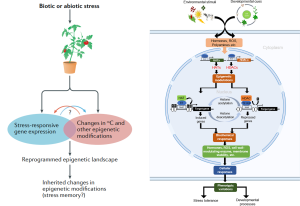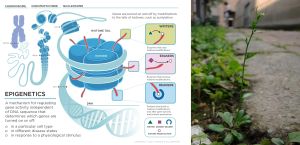Research
Theme
Epigenetic regulation is an emerging field of science that involves changes in gene regulation without altering DNA sequences. This process has been discovered in almost all higher eukaryotes, including humans and plants. Dysregulation in histone modification and DNA methylation is highly linked to human diseases, particularly cancer, and multiple anti-tumor drugs targeting key epigenetic components have been approved by the FDA. Although Drosophila and mice are frequently used as animal models for epigenetic research due to their well-studied genetic framework and conserved molecular pathways relevant to human diseases, there are challenges that limit the broader inspection of epigenetic modifications in these models. Knock-out of a key epigenetic regulator frequently leads to embryonic deaths and/or infertility, limiting the spectrum of epigenetic study. Additionally, environment-induced epigenetic modifications are not consistently observed in animal models.
System
To overcome the limitations of animal research, the Lee Lab is studying epigenetic research in Arabidopsis thaliana as a model plant. Arabidopsis is tolerant of the loss of various epigenetic genes that are homologous to human genes, including key cancer controllers. Furthermore, Arabidopsis provides an experimental system that allows for correlations between controllable environmental signals, epigenetic modifications, and phenotypic outcomes. The Lee Lab has been studying Arabidopsis mutants based on human homologous genes involved in epigenetic regulation, which are potential targets for cancer drug development. The lab monitors the roles of epigenetic genes and their controlling target genes via combining functional and bioinformatic analyses, such as whole-genome transcriptome (RNA seq and lncRNA seq), small RNA-omics (total small RNA seq), methylome (bisulfite seq), and chromatin modifications (ATAC seq and ChIP seq).

Topic
The Lee Lab’s research program is centered on understanding the epigenetic mechanisms that regulate gene expression in plants under various environmental conditions. Using Arabidopsis thaliana as a model organism, the lab studies epigenetic mechanisms in various environmental conditions to identify the genes and environmental factors that influence gene expression and their potential impact on plant growth, crop yields, and human health.
The Lee Lab collaborates with enthusiastic undergraduate students from Duke Kunshan University to conduct research, and together they have written multiple manuscripts on various aspects of plant epigenetics. The lab involves students in all aspects of the research process to provide them with valuable hands-on experience that is crucial for developing scientific skills and critical thinking abilities. This approach promotes peer mentoring and a positive dynamic in the lab, where students learn from each other and build strong working relationships.

